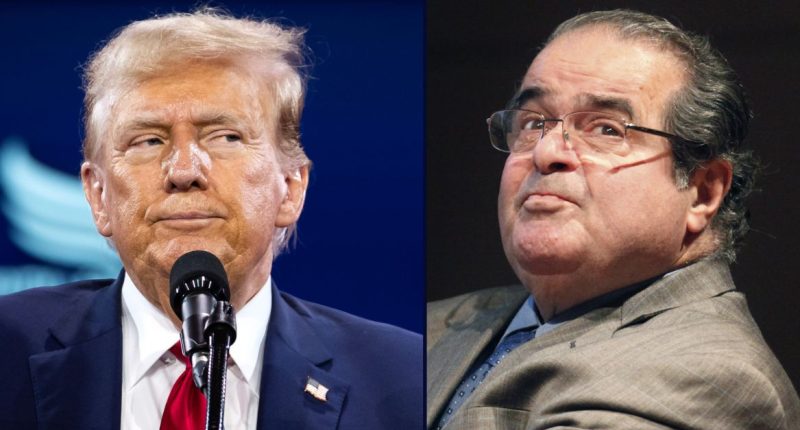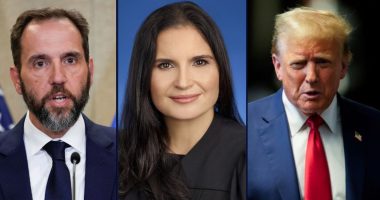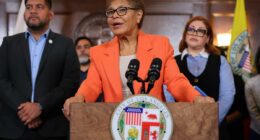Share this @internewscast.com
Left: Donald Trump delivers a speech at the annual Road to Majority conference held in Washington, DC, in June 2024 (Allison Bailey/NurPhoto via AP). Right: U.S. Supreme Court Justice Antonin Scalia glances up at the balcony before speaking at the Chicago-Kent College of Law in Chicago. (AP Photo/Charles Rex Arbogast, File).
The late Justice Antonin Scalia from the U.S. Supreme Court was referenced as a critical point against the Trump administration by a doubtful appellate court judge during oral arguments in a case concerning President Donald Trump’s attempts to change birthright citizenship on Wednesday.
While presenting before a three-judge panel at the U.S. Court of Appeals for the 9th Circuit, the U.S. Department of Justice attorney Eric McArthur frequently encountered skeptical questioning from U.S. Circuit Judge Ronald M. Gould, appointed by Bill Clinton.
But it was another Clinton appointee, U.S. Circuit Judge Michael Daly Hawkins, who brought up Scalia, widely considered the forebear of textualist jurisprudence and the modern day conservative legal movement. And Hawkins was less aggressive — even deferential and apologetic — when striking the blow late in the session as the judges quizzed the DOJ lawyer about constitutional interpretation.
“Forgive me if this appears to be a bit unfair,” the judge began.
Love true crime? Sign up for our newsletter, The Law&Crime Docket, to get the latest real-life crime stories delivered right to your inbox.
“I’d be interested in your perspective on this,” Hawkins went on. “You clerked at the U.S. Supreme Court, correct?”
The DOJ attorney answered in the affirmative, adding: “Years ago.”
“And when you were clerking, was Justice Scalia still on the court?” the judge continued.
“He was,” McArthur answered.
The judge then went in for the aforementioned blow.
“What do you think he would say about looking beyond the mere words of the amendment?” Hawkins asked.
The government lawyer gave a reply hearkening back to his early arguments, saying: “I think Justice Scalia would be very open to looking at all of the historical evidence that tells us how those words were understood at the time.”
Hawkins apparent point in trying to needle McArthur with Scalia’s commitment to looking to the plain text of any given legal document — at first, at least; often above all else — had to do with the government’s insistence that more than the text of the 14th Amendment is necessary to understand the grant of birthright citizenship.
To hear the government tell it, courts should have to read in the notion that “domicile” is required for the parents of those granted birthright citizenship. In one of their reply briefs, government lawyers described domicile as meaning “citizens and aliens lawfully” in the country.
Throughout the hearing, the panel largely seemed to express discomfort with this argument from the government.
“I’m looking at the language of the citizenship clause,” Gould said. “I don’t see any language in there, textually, that says they have to be domiciled.”
The government lawyer conceded the criticism but not the point.
“There isn’t a reference to domicile,” he admitted. “The logic of the argument is — step number one is: that ‘subject to the jurisdiction thereof means subject to the complete political jurisdiction of the United States, not simply the regulatory jurisdiction where you have a duty to obey U.S. law as the district court held. And step number two of the argument is that in order for foreigners who are coming from abroad, to be subject to the complete political jurisdiction of the United States, they have to be domiciled here.”
The judges and McArthur then spent a significant amount of time sussing out the concept of so-called “political jurisdiction.”
This is another term which does not appear in the amendment itself. The government argues, however, that the concept explains what the 14th Amendment means in the section reading: “subject to the jurisdiction thereof.”
To hear the Trump administration tell it, this concept precludes birthright citizenship for the children of undocumented immigrants because of an 1884 ruling by the U.S. Supreme Court which includes the following interpretation of the 14th Amendment: “The evident meaning of these last words is not merely subject in some respect or degree to the jurisdiction of the United States, but completely subject to their political jurisdiction and owing them direct and immediate allegiance.”
The government lawyer settled on a reflexive idea of “political jurisdiction” where a U.S. citizen abroad can be prosecuted as a traitor by the U.S. government but who would also be protected in the event they were prosecuted by a foreign government.
After some back and forth on this issue, Gould asked whether a person in the United States who has been granted asylum is being protected against a foreign government.
McArthur agreed this was true “in a sense” but used the opportunity to argue against the injunctions issued by district courts in Maryland, Washington and Massachusetts prohibiting federal agencies from implementing or enforcing Trump’s Executive Order 14160. He said the lower courts have stopped the administration from clarifying how the executive order would apply, in practice, to several classes of people, including those who have been granted asylum.
Trump-appointed U.S. Circuit Judge Patrick J. Bumatay pressed the DOJ lawyer to account for why the 14th Amendment must necessarily be talking about “unique” political jurisdiction — as opposed to “more common” jurisdiction in the sense of merely being subject to a country’s laws and punishments.
Here, McArthur brought up one of his preferred talking points — referring to public congressional debates about the 14th Amendment where one of the leading proponents expressed his desire to limit the reach of citizenship to exclude those “owing allegiance to anybody else.”
The DOJ lawyer returned to those Civil War-era congressional debates when asked to account for Scalia’s presumed opinion.
“You had a whole debate about what does ‘subject to the jurisdiction thereof’ mean,” McArthur said. “And the answer, from the proponents of the 14th Amendment, was that would not make citizens of the Native Americans because they owe allegiance to their tribes.”
The court rejected this understanding.
“Justice Scalia viewed the Constitution, in terms of interpretation, as a statute,” Hawkins went on. “And he was widely critical of looking at congressional history and statements of senators, a particular thing, and he famously said, ‘Just the words.””
To which McArthur replied: “I don’t dispute that Justice Scalia was very skeptical of reliance on legislate history. I think he took a different approach when you are looking at: ‘How are these words understood at the time?’”
Gould then asked if any dictionaries from the late 1800s defined “jurisdiction in terms of allegiance.”
The government lawyer said he was not aware of any.














